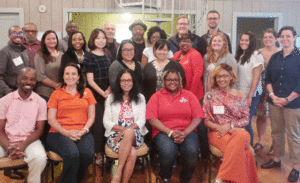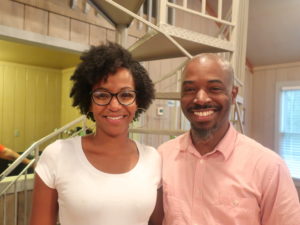Clemson University hosted its inaugural Race Symposium last week, bringing scholars from across North America together to discuss opportunities, challenges, and current work associated with Race-related research in leisure studies.

Although progress is being made to increase diversity in higher education, a recent study released by the American Council on Education demonstrates that more needs to be done. The study found that while diversity among faculty, staff and administrators is increasing, nearly three-quarters of full-time faculty identify as white. People of color also represented less than one-fifth of senior executives on campus.
“One of the priorities outlined in the university’s ClemsonFORWARD 10-year strategic plan is to enhance diversity and create an environment of inclusive excellence,” says Wayne Freimund, PRTM Chair. “There is a clear need for diversity in the leisure studies field, where our professional ranks and emerging academic leadership is relatively homogenous. We’re going all-in as a department to change that.”
The symposium was co-sponsored by the Department of Parks, Recreation, and Tourism Management, the College of Behavioral, Social, and Health Sciences, and the university’s Office of Inclusion and Equity. Pathway Post-Doctoral Fellow Aby Sène-Harper and Assistant Professor Harrison Pinckney led the organization of this event to address a growing need in research on Race and leisure. “We know that several of our colleagues in the field are doing important work in this area, however, there aren’t many opportunities for this community to come together, share ideas in a focused discussion, and support one another,” says Sène-Harper. “We wanted to get a sense of what research was already underway, and provide valuable input – and a shared direction – for moving forward.”
The symposium explored how the leisure research field currently examines Race, trends taking place in other disciplines, and how scholars can work together to support the development of a relevant body of work about Race in a leisure context. Sessions included discussions about how the concept of Race developed in the United States, a history of Race in leisure studies, and an overview for responsibly engaging in Race scholarship. Junior faculty and PhD students were also provided with the space to present their research ideas and receive comprehensive feedback from peers and leaders in the field to hone their research focus.

“Working together gives us a unique opportunity to see our research through different perspectives and levels of academic experience,” says Pinckney. “Participants can use the input they received to strengthen or refocus their research goals, while also creating new opportunities for collaboration with our colleagues moving forward.”
Before the symposium ended, teams were encouraged to continue to work together over the coming months to develop a manuscript addressing some aspect of Race scholarship in leisure, such as a systematic leisure review, literature content analysis, concept paper or research study. The department is looking to host an annual gathering of emerging and established Race scholars and plans are already underway for continuing this important work.
“We had some invaluable group discussions and generated positive momentum, and we want to keep that going,” continues Pinckney. “Continuing to come together can help us track our progress. For example, will we see increased diversity in faculty throughout the country? Are the number of published research results increasing? Are there other impacts? Hosting this event on a regular basis can help us identify trends – either positive or negative – and create lasting opportunity.”
Feedback received from symposium events will also help guide PRTM department efforts to meet the ClemsonFORWARD goal of making the university an outstanding place to live, learn and work, while also increasing diversity and a climate of inclusive excellence.
